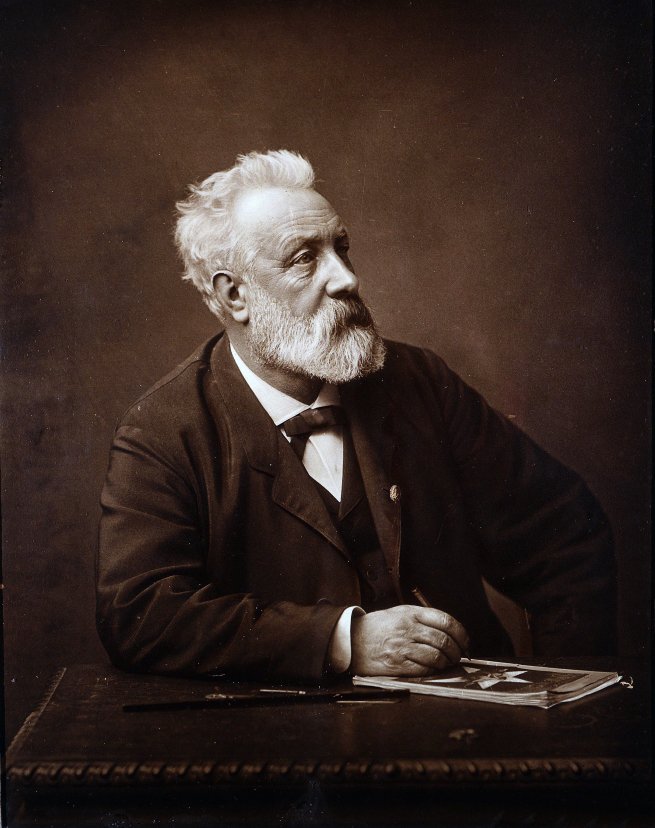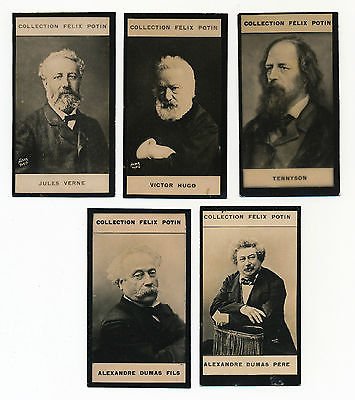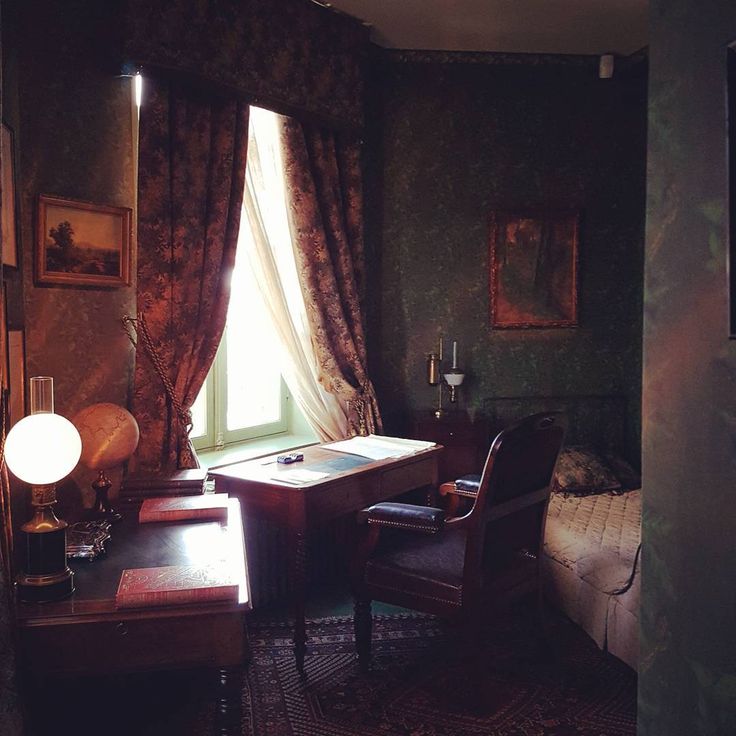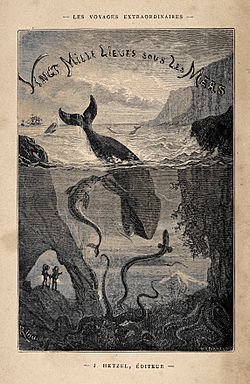Jules Verne
Hi friends, I hope you're fine?
I wanted today to know a little better Jules Vernes, I like to know the stories of the great men of this world.

Jules Verne was born February 8, 1828 in Nantes and died March 24, 1905 in Amiens. He is a French writer whose work consists of adventure novels using the scientific advances of the nineteenth century.
In 1863 appeared his first novel, Five Weeks in Balloon, which enjoyed great success even abroad. From the Adventures of Captain Hatteras, his novels will be part of Extraordinary Journeys, which will include 62 novels and 18 short stories.
The intrigues of Jules Verne's novels, always well documented, generally take place during the second half of the nineteenth century, taking into account the technologies available at the time.
Jules Verne's work is popular all over the world and with a total of 4702 translations, he is the second most translated foreign language author after Agatha Christie. In 2011, he is the most widely translated French-language author in the world.
History
Jules Verne is the eldest of a family of five children.
In 1834, at the age of six, he was boarded in a school run by Madame Sambin, widow of a long-distance captain. The following year, he entered with his brother at St. Stanislaus College, a religious establishment in keeping with the very Catholic spirit of his father.
He had a taste for the music he will keep all his life.
In 1840, Jules Verne entered the minor seminary of Saint-Donatien, which he described in his unfinished novel A Priest in 1839 in a rather uncomplimentary way.
The same year, his father buys a holiday villa in Chantenay, still existing at 29 bis rue des Réformes, opposite the church of Saint-Martin de Chantenay.
The whole family likes to meet in this country house. Jules's holidays also take place in Brains, near Nantes, on the property of his uncle, a former single shipowner, who went around the world and returned to settle in his homeland. The young Jules likes to play endless game games with the old wanderer.
The legend says that in 1839, at the age of 11, little Jules would have embarked on a long-haul bound for India, as a moss. His father would have recovered him in extremis in Paimboeuf. Jules Verne would have confessed to having left to bring back a necklace of coral to his cousin, Caroline Tronson, of which he was in love. Rudely punished by his father, he would have promised to travel only in dreams.
From 1844 to 1846, Jules and Paul entered the Royal High School of Nantes. He and his classmates attend the Club des externs of the Royal College, which is held in the library of Father Bodin, Pillory Square. After finishing the classes of rhetoric and philosophy, he passes the tests of the baccalaureat in Rennes and receives the mention "quite well", July 29, 1846.
In 1847, Jules Verne was sent to Paris by his father, to follow his studies but also because it wanted to move away from Nantes. Indeed, Caroline Tronson, his cousin Jules, which he is in love, must get married April 27 the same year with Emile Dezaunay, a man of forty years from Besancon. Jules Verne conceived a deep bitterness.
After a short stay in Paris, where he passes his first year law exams, he returns to Nantes to prepare with the help of his father the second year. It was at this time that he met Rose Herminie Arnaud Grossetière, for whom he was going to experience a violent passion. Her first book of poetry contains many allusions to the young woman, including Acrostiche or The Girl of the Air. Jules's love seems to have been shared for a moment, but the romance is broken. Herminie's parents have a problem with their daughter getting married to a young student whose future is not yet assured. They intend it to Armand Terrien of The Hague, a rich owner of ten years his eldest. Jules Verne is mad with rage.

Paris
In July 1848, Jules Verne definitively leaves Nantes for Paris. His father sends him to study law, hoping that he will succeed him one day. In his luggage, the young man carries an unfinished novel, A priest in 1839, plays including two tragedies in verse, Alexander VI and The Conspiracy of Powder, and his poems. In 1848, he obtained from his father to rent a furnished apartment (he was staying with his aunt at that time), which he shares with Édouard Bonamy, another student from Nantes, in a building located at 24, rue from the Ancienne-Comédie, overlooking the Place de l'Odeon.
Jules Verne arrives in Paris in a revolutionary period. In February, King Louis-Philippe was overthrown and fled; on February 24, the provisional government of the Second Republic was established. But the demonstrations succeed one another and the social climate is tense. In June, the barricades rise again in Paris; the government sends General Cavaignac to crush the insurrection.
On August 3rd, Jules Verne passed his exam for the second year of law. When Edouard Bonamy leaves Paris to return to Nantes at the end of the year, he gets a room for himself, in the same house. He plays with his relationships to frequent the big world. His uncle Chateaubourg introduced him to literary salons. He frequents that of Madame de Barrere, a friend of his mother. While continuing his studies, he is passionate about the theater and wrote many pieces that will remain mostly unpublished until 2005. He devours the dramas of Victor Hugo, Alexandre Dumas, Alfred de Vigny, the comedies of Alfred de Musset, but he admits a preference for two classics: Molière and Shakespeare.
The strongest influence at this time for the young writer is that of Victor Hugo.
At the time, he could recite whole pages of Notre-Dame de Paris by heart, but it was his plays that influenced him the most, and it was under this influence that at the age of seventeen, he wrote a number of tragedies and comedies, not to mention novels.
In order to earn some money, the young student gives lessons, which Pierre Verne sees with a bad eye.
From this time, the health of Jules Verne is deficient. For not always having enough to eat, he suffers from a stomach ache and stomach. Vernal enteralgia may be due to hereditary gastric disturbances, but especially to an early bulimia, which is undoubtedly pathological. In 1851, he experienced his first attack of facial paralysis. Olivier Dumas specifies these attacks that will hit Verne four times in his life. The poor heating of the student's home explains the frequency of its cooling. The causes of this infirmity remain unknown to the writer, he lives in the anxiety of a nervous disorder, leading to madness.
In the meantime, Verne has passed his law exam and can become a lawyer, as his father wishes.
Through his salon visits, he came into contact with Alexandre Dumas through a famous chiromancer of the time, the Knight of Arpentigny. He befriends the writer's son and offers him the manuscript of a comedy entitled Broken Straws. The two men correct the play and Dumas Jr. obtains from his father that it be performed at the Théâtre-Historique. It is June 12, 1850, Jules Verne is twenty-two years old.
Alexandre Dumas Jr. puts Verne in touch with the Seveste brothers who have just taken over the Théâtre-Historique after the bankruptcy due to the prodigalities of Dumas père. The new hall becomes the Lyric Theater. Jules Seveste, the new director, hires Verne as secretary. Strenuous work, because the young man does not receive first salary before being paid up to 100 francs. On the other hand, he can play his pieces.
He attends the National Library, is passionate about science and its most recent discoveries, but it is mostly geography that attracts him. Around this time, Verne meets an astonishing figure, an illustrious and tireless traveler, the explorer Jacques Arago, who continues to travel the world despite his blindness. He even publishes the story of his travels around the world under the title Memories of the Blind. The young writer finds near him all the sensations of his first readings. Jacques Arago opens horizons and leads to a new genre of literature, then expanding, the travel story.
In July 1854, Jules Seveste died of cholera. His successor, Emile Perrin, tries to retain Jules Verne, but he wants to keep his freedom. Perrin goes so far as to propose the direction of the Lyric Theater but he refused.
Despite his refusal to become director of the Lyric Theater, Verne retains his position as secretary until the end of 1855, which allows him to represent, on June 6 this year, a second comic opera written on a music by Hignard , The Companions of the Marjoram.
It is a period of intense creative activity. The plays accumulate. He refines one of them, Les Heureux du jour, which seems to be particularly close to his heart. He writes several short stories, including Anselme des Tilleuls' Wedding and An Ice Hibernation. The latter appears in 1855 in the Museum. Of all the manuscripts of Verne before his meeting with Hetzel, it is the one that gets closer to the Extraordinary Voyages, a true prelude to the Adventures of Captain Hatteras. At this time, he has a second bout of facial paralysis. His friend and doctor Victor Marcé is treating him with electricity.
1886 is a crucial year in the life of Jules Verne. On February 15, he decided to sell the Saint-Michel III, his boat because its maintenance becomes too expensive.
On February 15, 1887, his mother, Sophie Verne, dies, he can not go to the funeral, because he walks with difficulty and his recovery does not advance.
Forced to become sedentary, he defers his interest to the life of the city. In 1888, Jules Verne was elected to the municipal council of Amiens on the republican list. His intention is to make himself useful and to bring about certain urban reforms. He will sit there for fifteen years.
Knight of the Legion of Honor since August 1870, Jules Verne is promoted to the rank of officer on July 24, 1892. It is decorated on October 11 following by the prefect of the Somme.
On August 27, 1897, his brother Paul died of heart troubles he had suffered for a long time.
In 1900, Verne left the mansion on rue Charles Dubois and reinstated the house he had rented at 44 boulevard de Longueville. The apartment, less spacious, allows him to live more easily. He keeps his habits there: a study and his adjoining library. Always the same table on which he has been writing for thirty years.
In 1903, the writer no longer writes. He accepts the presidency of the Esperantophone Group of Amiens. Ardent defender of this young international language, he promises his friends to write a novel where he will describe the merits of Esperanto. He begins the writing of a study tour towards the end of the year. But, exhausted, Verne poses his pen after six chapters: when he began writing this novel in July 1903 on the basis of a detailed plot, Jules Verne had indeed located the action in Congo.Le draft will be taken over by his son Michel, but the final work, The Amazing Adventure of the Barsac Mission, will not refer to Esperanto.
Diabetes, which attacks its visual acuity, annihilates it little by little. After a severe attack towards the end of 1904, a new crisis the terrace, the 16 of March of the following year. Jules Verne died on March 24, 1905 in Amiens, in his house at 44 boulevard Longueville.
His funeral, celebrated at the church of St. Martin d'Amiens, attract a crowd of more than five thousand people. The writer is buried at the cemetery of the Madeleine in Amiens.
His marble tomb is made in 1907 by the sculptor Albert Roze. Entitled "Towards Immortality and the Eternal Youth", it represents the writer lifting the broken stone of his burial by spreading the shroud that drapes it, the arm extended towards the sky.
Seven novels by Jules Verne and a collection of short stories will be published after his death, published by his son Michel Verne, who will take the responsibility of reworking the manuscripts.

Heritage
Jules Verne leaves behind a rich work of extraordinary creativity. He is one of the first authors to mix science fiction, adventure and fantasy with such success. His interest in science and the fact that he addresses in his novels themes that will materialize in the course of the twentieth century like the trip to the moon or the submarine, give him the status of more futurist than visionary: making scientific and technical discoveries, he pushes the consequences of technical progress to the end in his works.
His novels will be frequently adapted to the cinema, their big-screen narrative lending itself perfectly to Hollywood productions. His characters are icons of the popular imagination.
There are things in his work that did not exist in his day and that were created 50 or 100 years after his writing like, the helicopter, the modern submarine, the scuba, the man in space , ...
In 2005, an exhibition entitled Jules Verne, the novel of the sea is dedicated to him at the National Museum of the Navy in Paris.
In 2015, Jules Verne is the twenty-third most celebrated figure on the front of 67,000 French public institutions: no less than 230 schools, colleges and high schools gave him his name.
Novels

He has written about sixty novels plus other writings but here are some of his most famous:
The adventures of Captain Hatteras
Around the world in 80 days
The mysterious island
Twenty thousand leagues under sea
Captain Grant's Children
Journey to the Center of the Earth
From the Earth to the moon
Michel Strogoff
Five weeks in a Balloon
Little man
The tribulations of a Chinese in China
Two years of vacation
Kerban the stubborn
The five hundred million Begum
Jonathan's Shipwrecked
(Text source)
I hope this article has allowed you to know a little more about this talented man that was Jules Verne.
He had a busy life, I tried to summarize it at best but I could not talk about all his life too long for a single article.
An incredible writer who can still speak to the people from the whole world :) He created characters who will be remembered for as long as books are printed and read and people dream... Michel Strogoff being my favourite among them
Downvoting a post can decrease pending rewards and make it less visible. Common reasons:
Submit
Thanks for taking your time to create this awesome article! Thumbs up!
Downvoting a post can decrease pending rewards and make it less visible. Common reasons:
Submit
Very knowledgeable post.really encouraged me
Thanks for sharing
Downvoting a post can decrease pending rewards and make it less visible. Common reasons:
Submit
You Got an upvote because this content is good and must be upvoted .
(This reply for the good contents only ) Keep going .
We all working for the good content any good content will be upvoted :)
Downvoting a post can decrease pending rewards and make it less visible. Common reasons:
Submit
Thanks for sharing great post
@lndesta120282
Downvoting a post can decrease pending rewards and make it less visible. Common reasons:
Submit
Thank you for better identification
Downvoting a post can decrease pending rewards and make it less visible. Common reasons:
Submit
I really like your posts and I enjoy greatly with all your posts, amazing, amazing knowledge.
Downvoting a post can decrease pending rewards and make it less visible. Common reasons:
Submit
Thanks for sharing. I learned a lot :)
Downvoting a post can decrease pending rewards and make it less visible. Common reasons:
Submit
Congratulations @lndesta120282, this post is the fifth most rewarded post (based on pending payouts) in the last 12 hours written by a Superuser account holder (accounts that hold between 1 and 10 Mega Vests). The total number of posts by Superuser account holders during this period was 1592 and the total pending payments to posts in this category was $12377.24. To see the full list of highest paid posts across all accounts categories, click here.
If you do not wish to receive these messages in future, please reply stop to this comment.
Downvoting a post can decrease pending rewards and make it less visible. Common reasons:
Submit
Interesting article, yeah his imagination created the submarines, the television and many impressive things. Glad to read about him in detail.
Downvoting a post can decrease pending rewards and make it less visible. Common reasons:
Submit
Wow...again....such a wonderful and interesting flowers by @lndesta120282
Nicely done medam...execellent work again...
Downvoting a post can decrease pending rewards and make it less visible. Common reasons:
Submit
Congratulations, your post received one of the top 10 most powerful upvotes in the last 12 hours. You received an upvote from @glitterfart valued at 130.71 SBD, based on the pending payout at the time the data was extracted.
If you do not wish to receive these messages in future, reply with the word "stop".
Downvoting a post can decrease pending rewards and make it less visible. Common reasons:
Submit